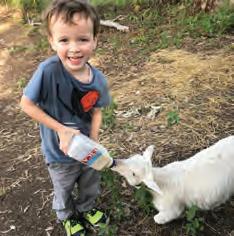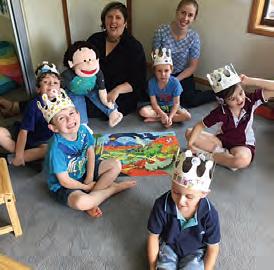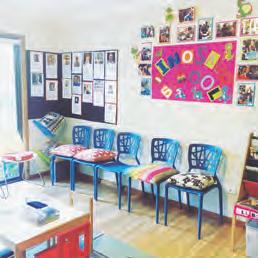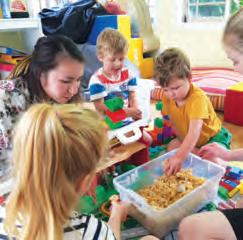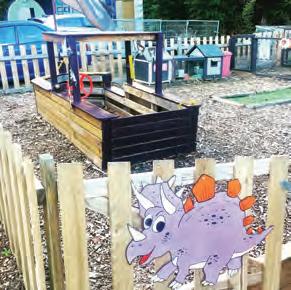
7 minute read
Separation anxiety in babies and toddlers
BY LAURA KILN PgDip (CBT) (Child & Adolescence), BSc (Hons) CMHN
Separation anxiety is normal during early childhood development. Separation anxiety is when a child gets upset when separated from a parent or loved carer. For example, a young child may become distressed when left with a baby sitter. Infants during the first few months of life become attached to their main carer or carers. This is because they learn that their carer can provide love, attention, comfort and nourishment.
It usually starts at about six to eight months of age and can last until about two and a half to four years. Sometimes it can last longer if the child has had any painful separations in the early years. Separation anxiety reflects the child’s attempts to hold on to what is safe in a very scary world, and it will settle down as the child grows older and more confident.
At around 10 months, most babies get upset if a stranger comes up to them in an unfamiliar room. Only 50% get upset if they have time to get used to the room. This means that in new situations, babies cope better when they come across new things gradually A baby generally starts worrying about being away from carers when he is old enough to know that he is a separate individual from his parents, that there are special people in his life who look after him, and when he can clearly recognise the difference between family members and strangers. Knowing that the special person(s) is near helps the child to feel safe as he takes his first steps into a big and scary world. When the child’s special person is not ther e, the child becomes upset – often this brings the parent or carer back, and the child feels safe again. If a pattern is established where the special person always comes back after small separations, the child will learn that the world is a safe place, and he is able to be happy when the special people aren’t there. The separations need to be very short
Formulating The Future One Thought at a Time...
1 Bridge Avenue Chain Valley Bay NSW 2259 4358 3155 Workshops Early Learning Centre Mentoring Workshops Early Learning Centre Mentoring 1 Bridge Avenue Chain Valley Bay 4358 3155 IS YOUR FAMILY COMPLETE? Have you thought of your options? Have you considered a vasectomy? 30 Renwick Street, Wyoming Phone: 4328 2122

Vasectomies are a permanent and very effective way to stop unwanted pregnancies. They are performed under local anaesthetic and have a quick recovery time. For more information regarding the procedure, fees or any other issues of concern please visit our website or contact our friendly staff. www.cornerfamilysurgery.com.au
at first, because the child does not understand that their special person will be coming back. It takes a long time – years – for the child to feel safe when the special person is not there.
Bedtime F rom about 6 months of age, children may get upset at bedtime, or even when the parent leaves the room – these are separations. Ba bies don’t understand that their parents may still be close by when they cannot see them. A ba by or toddler may try to follow the parent to keep her or him in sight, and can get very “clingy”. It is best to comfort and resettle your baby than letting them cry. The child ma y become more upset until the child is about fifteen to eighteen months old, and then gradually become less upset as the child becomes more confident. Alw ays ensure your child will be safe and well looked after at the place where you are leaving her, so that you can feel confident in letting her know that she will be fine. If possible, help her get to kno w any new situation or carer while you are there. If your baby or young child is going to child care, try to find a place where there will be only one or two people who will be her special carers and who will usually be there when she is there. Always say goodbye, even if you have to go while she is upset. This builds trust. Sneaking out or trying to get away may make a child feel that you can’t be trusted. Once y ou have said “goodbye” try not to drag out your departure as this is unlikely to be helpful. When going out, try to leave the child with someone he knows well. Show that you understand his feelings, eg. “I know you wish I could stay. I wish I could stay with you too”. Let the child mind something of yours (such as a bag or keys) when you are not there. Help him to kno w when you will be coming back. Tell him in ways he understands, eg. “after lunch”. Be r eliable, always come back when you say you will. If for some reason you can’t get back on time, let the carer know, so she can tell your child what has happened.. R ead stories about separations. Sometimes if childr en are away from parents during the day they seem to want to make up time at night by staying up late. Try to give them a little extra time with you in the evenings. Separation anxiety disorder in children As children reach preschool and school age, they’re less likely to have separation anxiety. Of course, there’ll always be times when they only want to be with you.
If your preschool-age or school-age child seems particularly and regularly upset about being separated from you, it’s possible he has separation anxiety disorder. About 4% of preschoolers and school-age children develop this condition.
Separation anxiety disorder is when: the anxiety interferes with your child’s life, and therefore with your life your child has more severe anxiety than other children the same age your child’s anxiety has gone on for at least four weeks.
If you’re concerned your child might have separation anxiety disorder, look out for times when she/he dislik es being separated from you w orries that you or she might get hurt or have an accident r efuses to go to child care, preschool or school r efuses to sleep at other people’s places without you complains a bout feeling sick when separated.
Laura Kiln has moved to the Central Coast from the UK where she worked in London at the Institute of Psychiatry and the National Specialist Centre for Child and Adolescent Mental Health. She has over 20 years experience of working with families and is internationally recognised as an expert in the field of Parenting. She has four children herself and is used to the dramas of family life. Her practice ‘Laura’s Place’, is open for self or GP referral. Tel: (02) 4385 5587 www.laurasplace.com.au. Laura has appeared on Channel 9 TODAY show as a parenting expert.
The I Can Read literacy system arose from research undertaken by Australian educational psychologists, it has now gained global success with over 50,000 students in seven countries. I Can Read centres are total literacy centres, covering all aspects of literacy including: • reading • spelling • vocabulary • comprehension • grammar • written composition • public speaking • drama • preparation for kindergarten • preparation for selective schools Boost literacy skills!
Book in for a free assessment at Erina Fair with Clare Egan – MSpeEd (Newcastle) by calling 0438 284 739 For excellence in literacy, always consult professionals.

Designed and supported by educational psychologists. www.icanreadsystem.com
